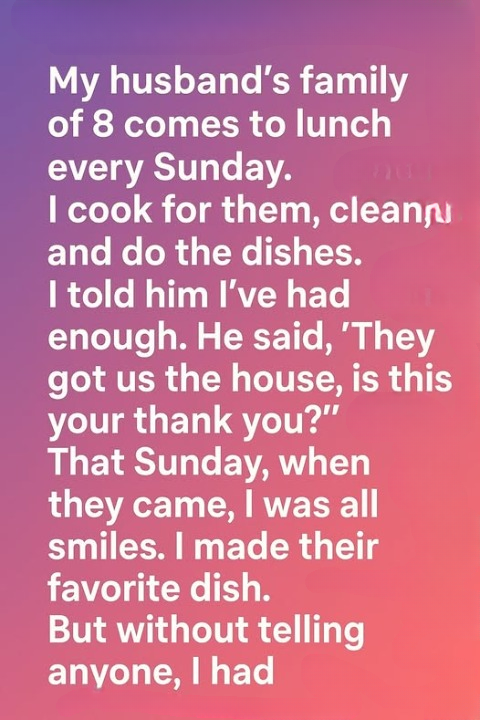Every Sunday, my home became the hub of family life. My husband’s relatives—eight in total—arrived like clockwork for lunch. To anyone outside, it looked like a cheerful, love-filled gathering. But behind the scenes, I was exhausted: cooking elaborate meals, washing endless dishes, and keeping the house spotless. For years, I played the perfect hostess, hiding how drained I felt. What should have been a joyful tradition had quietly become a routine of overwhelm.
One night, after yet another marathon of cleaning, I finally spoke up to my husband. I told him I couldn’t carry the entire household alone anymore. His response stunned me: “They got us this house. Isn’t this the least we can do?” Gratitude, I realized, should never equal servitude. His words stung—but they also lit a spark. If my efforts went unnoticed, I would need to take control myself.
The following Sunday began like any other—smiles, greetings, and a beautifully set table. But after the meal, I clapped my hands and announced, “Today will be different.” The young woman I had quietly hired stepped in to help with dishes and cleanup. The family froze, clearly surprised. I laid out my choice: either everyone would share responsibilities, or I would continue hiring help.
The change was immediate. My husband’s sisters started chopping vegetables, his mother helped set the table, and even the brothers pitched in with dishes. Sundays became lighter, filled with cooperation and genuine respect. My husband admitted he hadn’t realized how much I had been carrying until he saw the difference in my mood and energy.
What began as a small act of courage transformed our entire family dynamic. I was no longer the silent hostess bearing the burden alone—I had reclaimed my voice, my boundaries, and my role as an equal partner.
